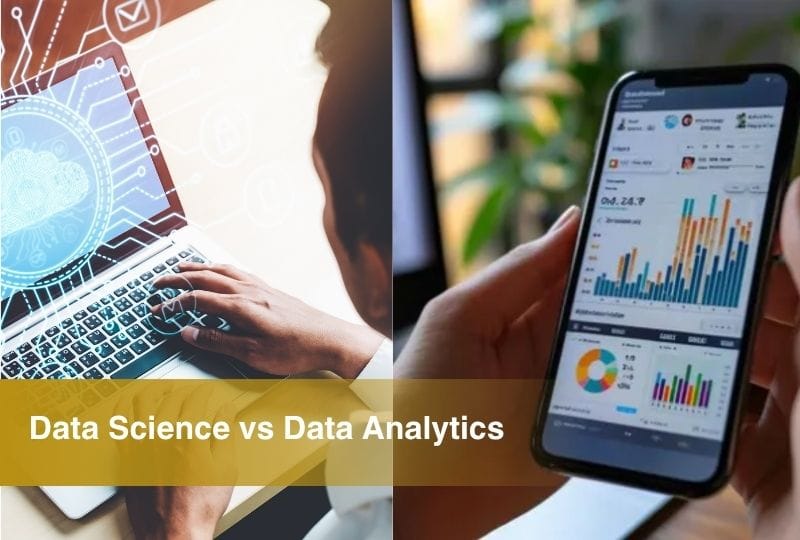In today’s digital economy, data has become the backbone of decision-making and innovation. From predicting consumer behavior to shaping healthcare outcomes, careers in data are in high demand. However, many students remain confused when choosing between data science and data analytics. While both careers deal with data, they differ in objectives, tools, and long-term career opportunities. Understanding the difference between data science and data analytics is crucial for choosing the right path.
Understanding the Basics: Data Science vs. Data Analytics
At its core, the data science vs analytics career comparison begins with definitions.- Data Science involves using advanced techniques like machine learning, artificial intelligence, and predictive modeling to forecast future outcomes. It answers “what will happen next?”
- Data Analytics focuses on analyzing historical data to identify trends, patterns, and insights. It answers “what happened and why?”
Key Differences Between Data Science and Data Analytics
Focus and Objective
The primary difference between data science and data analytics lies in scope. Data Science builds algorithms and models for predictions, while Data Analytics translates raw data into actionable insights for immediate business decisions.Tools and Technologies Used
- Data Science tools: Python, R, TensorFlow, Hadoop, Spark.
- Data Analytics tools: Excel, SQL, Tableau, and Power BI.
Skills Required
Data Science vs data analytics skills required differ significantly.- Data Science: strong programming, mathematics, statistics, and ML knowledge.
- Data Analytics: data visualization, BI tools, SQL, and problem-solving.
Complexity of Work
Data Science is research-driven, requiring complex model-building and experimentation. Data Analytics is comparatively simpler, focusing on interpretation and decision-making. For beginners, data science vs data analytics often depends on comfort with coding and statistics.Data Scientist vs. Data Analyst: Roles and Responsibilities
Understanding data scientist vs data analyst roles clarifies expectations.Aspect | Data Scientist | Data Analyst |
Primary Role | Build predictive models, use ML | Interpret datasets, prepare dashboards |
Focus | Forecast future trends | Explain past and present trends |
Tools | Python, R, TensorFlow | Excel, Tableau, SQL |
Deliverables | Algorithms, predictive solutions | Reports, business insights |
Career Path: Data Science vs Data Analytics
Entry-Level Opportunities
Entry roles in a career in data science vs data analytics differ. Freshers can start as:- Junior Data Analyst, Business Analyst (Analytics).
- Associate Data Scientist, ML Engineer (Data Science).
Career Growth Potential
Both fields offer steady growth, but Data Science often leads to roles like Data Architect or AI Specialist. Analytics professionals can grow into Business Intelligence Managers or Strategy Consultants.Industry Demand
Job opportunities in data science and data analytics exist in IT, finance, e-commerce, retail, and healthcare. With digital transformation, demand is strong in India and globally.Salary Comparison: Data Science vs Data Analytics in India
When comparing data science vs data analytics salary, the differences are significant.- Data Analysts in India earn ₹4-6 LPA as freshers, with growth to ₹10-12 LPA in mid-career.
- Data Scientists in India earn ₹6-8 LPA initially, with experienced professionals earning ₹15-20 LPA.
Future Scope of Data Science and Data Analytics
The future of data science and data analytics is promising as industries embrace automation, big data, and AI.- Data Science: crucial for building AI systems, deep learning models, and automation.
- Data Analytics: central for decision-making in every business sector.
Data Science vs. Data Analytics: Which Should You Choose?
If you enjoy coding, machine learning, and advanced mathematics, Data Science may be your path. If you prefer business insights, visualization, and simpler tools, Data Analytics is better. Ultimately, the data science vs business analytics career path decision depends on personal interests, not just market trends.Best Courses for Data Science and Data Analytics in India
There are several of the best courses for data science and data analytics available in India:- Online certifications (Coursera, edX, Google).
- Professional diplomas in analytics.
- Bachelor’s or Master’s in Data Science.
- Short-term bootcamps in ML or BI tools.


